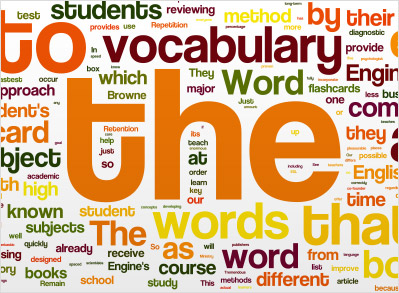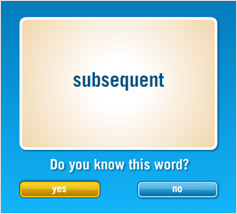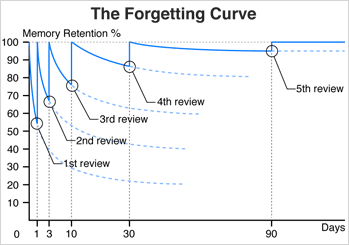How it works
Lexxica Prepares the Right Words for Each Subject

Top linguists and researchers have reported that 97 percent vocabulary comprehension is the point at which reading becomes pleasurable. They highly recommend students learn 97 percent of the vocabulary needed for their subject as quickly as possible. That's good scientific advice but because language usage differs so widely from one subject to another it is difficult to know which words to study. Top publishers offer vocabulary word list books for business subjects and popular exams such as TOEFL® and TOEIC®. Each year millions of students buy vocabulary list books to help them quickly improve exam scores.
The major drawback of vocabulary books and even computer vocabulary programs is that regardless of the learner's ability, they teach the same content to everyone. Tremendous amounts of time are wasted reviewing English that is already known. Wouldn't it be fantastic if a computer could diagnose each student's actual needs and prepare a personalized learning course focusing on the most important vocabulary they are missing?
The Lexxica Corporation was formed in 2005 to develop a new solution. Co-founder Dr. Brent Culligan, a computational linguist and university English professor, developed a process to determine the exact amount of comprehension that each word contributes to different academic, general and business subjects. Simply put, the words that occur most often are most important to comprehension and the words that occur less often are less important. By ranking each word by its statistical value, Lexxica can determine which words most rapidly provide up to 99 percent vocabulary comprehension for any given subject.
Lexxica Tests Vocabulary Ability So Students Remain Focused on Learning Just the English They Are Missing - High Speed Learning
In addition to developing accurate vocabulary lists Dr. Culligan and the Lexxica team have developed a patented diagnostic test called V-Check. When a student takes the V-Check test it identifies the probabilities of their knowing each of the 25,000 words in Lexxica's database. The V-Check system then calculates the sum value of a student's known words against the requirement for each subject. V-Check reports a student's comprehension as a coverage percentage for each different subject. V-Check then removes known words from the learning course so students can stay focused on learning just the words they are missing for their subject.
The V-Check diagnostic test makes Word Engine the fastest learning method available today simply because no time is wasted on reviewing what is already known.
Word Engine teaches all major aspects of word knowledge including: sight, sound and contextual recognition. Lexxica scientists monitor results and receive feedback and comments from thousands of students in order to refine and improve the Word Engine's high speed Study Mode interface. Our number one goal is to provide learners with the fastest and most effective learning system possible.

Spaced Repetition Assures Long-Term Retention

The Word Engine uses spaced repetition science to promote long-term memory retention. Each new word is automatically given repeated exposure until it is fully retained.
The 19th century German psychologist Dr. Hermann Ebbinghaus first reported his research on human memory in 1895. Many learning methods have been developed based on Dr. Ebbinghaus' findings. Among the most notable are the methods developed by: Mace, Pimsleur and Leitner. The Word Engine's learning tools incorporate the core human memory facts that were identified by Dr. Ebbinghaus and integrate them with the proven successful 'card boxes' approach developed by Dr. Leitner.
Dr. Leitner's original 'card boxes' approach was designed to help students organize hundreds of printed vocabulary flashcards and study them repeatedly over the time intervals recommended by Dr. Ebbinghaus. Teachers and schools that have used the card boxes approach have attained remarkable results. During the Word Engine's early development stage co-founder Dr. Charles Browne visited one high school in Kyoto that was using the card boxes approach. Dr. Browne found that practically all of the students at the high school spoke fluent English. After reviewing the curriculum at the high school Dr. Browne concluded that the only significant difference was their use of the vocabulary card boxes method. Dr. Browne is a respected advisor and teacher-trainer for the Japanese Ministry of Education as well as the author of more than a dozen ESL curriculum and CALL method books.
In essence the Leitner card boxes method introduces "Unseen" words and then re-tests comprehension at five increasingly greater time intervals (See charts). Each student must correctly identify each particular word at each different time interval or the word is sent back to the beginning. The only weakness of Leitner's card boxes is that it places an enormous burden on teachers and students to prepare and manage thousands of paper flashcards and five different boxes for each student.

The Word Engine solves the major weakness of Dr. Leitner's card boxes method by digitizing and automating each student's flashcards and boxes and by providing ready to use word lists for a variety of academic, general and business subjects. Furthermore, the Word Engine personalizes each student's course by removing words that are already known so they can focus on learning just the words they are missing.




